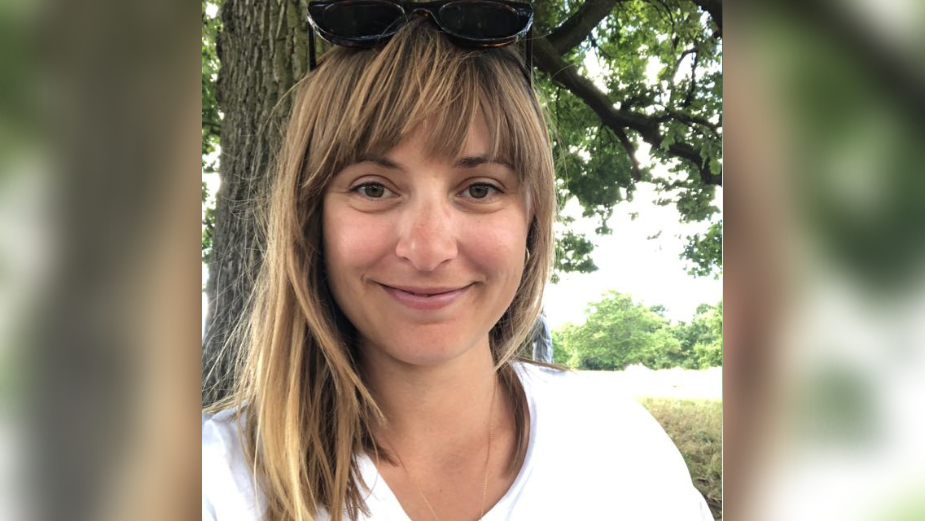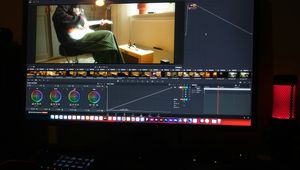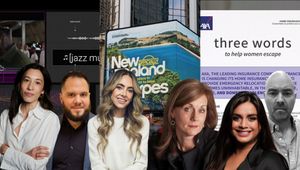
Charlie Dodd Likes to Help 'Impossible Things' Survive

At OKAY STUDIO we’ve become known for eye-opening campaigns, made by creatives that go that little bit further - ensuring that the work really means something. We believe that advertising, and film in particular, has the power to enact cultural shifts that will take us closer to a society that is fairer for all. That is why we are thrilled to support this LBB interview series to hear about our industry peers’ favourite ground-breaking work, the kind of pieces that make you stop and think.
Charlie Dodd is the head of integrated production at Lucky Generals, a creative company on a mission to broaden what creativity can be. Before joining Lucky Generals, Charlie spen over a decade honing her craft - first in film production at BBH and then over a series of category-defying projects that pushed creative boundaries, like a play at the Waterloo Vaults for Centrepoint Homelessness charity and a once-in-a-lifetime astronaut training camp in the Kennedy Space Centre for Axe.
As a producer, Charlie is most excited by the “untrodden path” which explores new ways of connecting and engaging with audiences, like through experiences, films, parties, and pop ups. Anything as long as it’s not just a TV ad. Interested in preserving the integrity of creative ideas, she also sees every project as inherently collaborative, living by the mantra “hold a strong opinion lightly.”
Today, she tells LBB all about her route into the industry, taking bold steps early on in her career, and why audiences today expect high-calibre content across all platforms.
LBB> How did you get into producing? Was this always the plan?
Charlie> I have always loved problem solving and making things, being part of a creative project. I’m that girl who was involved with everything at school, every extracurricular activity. But I didn’t know that there was a job at the end of it. I knew I wanted to be part of the creative arts, my mum was an arts administrator. I didn’t know there was a way of being paid for doing what I love doing.
After university, I did a temp job in events, joining the Roundhouse. They have a youth project department and the gigs that are held there fund it. I was about 21 years old and I started a performance course there. Eventually, I quit my full time job and - without telling her - turned up at the actress’s home who ran that course, saying I was going to be working for her. I don’t know if I’d have the courage to do that again!
She was thrilled to have someone working for her, for free, and she took me under her wing and taught me the foundations of production and performance. She showed me that the creative world is held up by applying for grants and funding, space and time, so through that I got into more production at the Roundhouse. One day BBH came to the Roundhouse looking for young production talents, to diversify their output, and the Roundhouse offered me up.
LBB> As a producer, what motivates you?
Charlie> The same thing that always has - the joy of bringing something new to life. Working with talented creative people, and having all the adventures that come with it. I never stop learning but also never stop laughing. It’s lovely, not many people can say that.
LBB> Tapping into emotional narratives and presenting stories that challenge the status quo is something this industry is increasingly good at. Which of the projects that you have worked on do this, in your opinion?
Charlie> I love this question because it is very much a sign of our times and you’re right, we have got more and more good at it. When I was an assistant producer, having first joined advertising, that was not the case; people made TV ads and these sometimes were shown in cinemas; print ads and out of home ads. It was 2008 when I joined the industry, the beginning of the digital revolution and the financial crisis - both things motivated people to behave differently. I was part of an agenda to make different work and now it is the norm to make different types of work.
One of the things I have loved making most is a very simple film for ASOS many moons ago, with Pulse Films’ director Ben Newman. Ben worked on a one-page creative concept. His treatment, no creatives were part of the shoot, they trusted him. It was a real close director/creative partnership. My job was to support the production as much as I could, but really to trust in the creative hands of the director. It was for ASOS Urban Tour. In a day we shot this ferociously energetic spot. It really felt ‘of the moment’. The music, the pace, the energy. It was so incredible. Everyone loved working on it and when it was let out into the world it was picked up, and spread, and shared. It felt really thrilling to be part of something like that.
Right after that, actually, I produced something for Centrepoint youth homelessness. It was a one to one interactive play and we worked with the Youth Advisory Board for centerpoint. There were 12 of them. I found a theatre writer who had actually been a young homeless person herself, and another amazing theatre director, who works with young people from the Oval Theatre. Together, we created this play based on real interviews with real young people. It wasn’t a film and it wasn’t an ad in a traditional way. What it became was lobbying material. We invited members of parliament, journalists, and members of the public. It was beautiful, quite serious and impactful. It resulted in £13 million pounds worth of funding going towards youth homelessness, specifically towards education. This was when they’d just closed all the job centres down. It was amazing to see work, working. There was a very limited budget - I think the budget actually drove us into this area and format. It would’ve been so easy to make a film but our ambition wasn’t to get lots of people to see it, our ambition was to do something to change the situation.
Awareness is such a strange, vague term. It’s easy when it can be translated into sales.
I’ve got one more project actually - Axe Apollo Space Academy (Lynx in this country). They had a very big ambition, someone sauntered up to me in the atrium at work one day and said “we wanna send someone to space.” I was like yep, cool… won’t be doing that. Low and behold, a year and a half later, we had bought 25 tickets to space; a weird negotiation for any producer… I had built, from scratch, an international space cadet training academy in Florida. 37 languages were spoken, people from 50 countries, all coming to one place to fly jet planes. Astronaut speakers were there doing training, physical, scientific. It was just… I don’t think I’ve ever worked so hard in my life. But we created something unbelievably impossible. Literally out of this world. We had people from all over the world who were passionate about space, we made something from scratch. We made a documentary about it, it was on National Geographic, no media buying we just gave it away. It got viewed 30 million times, something ridiculous.
LBB> You’re now the head of integrated production at Lucky Generals. I read that you’re motivated by making the best kind of ‘other stuff’ - can you explain what you mean by this?
Charlie> I suppose the work that excites me most is on the untrodden path. So other stuff at Lucky Generals means… in my team I have an incredible art producer, an incredible integrated producer who does art and film production, incredibly project director who runs all of co-op and can think of everything from huge campaign bits to what appears in a magazine, connects all the partners up at the same time, quick bite sized pieces. Integrated at Lucky Generals just means ‘Not a TV Ad’. Integrated to me, means the running of and thinking about how we make work smarter, cheaper, better. Especially new or divergent work. The recent Cannes winners really demonstrate that kind of work and thinking that I love. Out of home helps you connect to people and tell a kind of story. We’ve done pop-up parties, out of homes, beautiful films, plays… and I just hope that list can be continuously added to.
LBB> An idea at conception rarely looks the same once it’s been made. How important is it to preserve the integrity of creative ideas? Is it always important to do so?
Charlie> I think it’s desperately important to preserve the creative connection to the audience. So, if a creative idea is written down in a deck in January, I don’t care if it looks anything like that when it comes out in December, as long as the idea still connects to people and sparks something. That integrity must be preserved, but not at the cost of allowing other creative roles to enhance it. Copywriters and art directors don't work in silos on a project, we would always bring in photographers, directors, designers, costume makers, post production - all of these people add and develop ideas. I suppose I’d say it’s important to “hold a strong opinion lightly.”
LBB> And how do you find that it's easy sometimes to steer away from that original idea?
Charlie> I’ve had the great pleasure of not needing to. I’ve worked with some incredible creative partners in all areas of the business and I think good creatives just want their idea to be the best it can be - they will happily take feedback and input. It’s perhaps harder for clients, especially if they want something measurable and neat and tidy, that they hope to make, and we make something maybe less measurable? I think that can be very difficult but then they probably don’t buy it in the first place.
LBB> Do you find that it is more difficult at the moment to get the bigger ideas through the door because of the focus on effectiveness, which is measurable?
Charlie> Yeah, the projects that I’ve worked on that have been most effective have very good brave clients behind them. It is safe to make a researched, measurable, media-buy campaign. It is far scarier to buy something which you can’t measure and guarantee, you just hope that the idea or the way in, is strong enough. In these cases, clients are often willing to do it, but put way less money behind it. Almost every job I get has a much lower budget than a traditional TV ad would. It’s through lowering that risk that brands feel brave enough to do it. However, they’re not gonna get the same return because they’re not investing the same.
On very few occasions - like Axe Apollo - the client was an incredibly brave, brilliant set of clients at Unilever and they made some really difficult decisions. They took some convincing but we showed them the evidence in favour of making a documentary, instead of a series of online films and putting a media buyer behind them which is the normal way to guarantee eyeballs. We created a treatment with a director and then we took it to the Cannes TV festival and we got different channels showing interest so we followed up on this. We calculated which channels would take the show for free and air it, what demographic they would be airing it to, trying to show some form of comparison. You put all of your media and production money into making the documentary and your results are X.
Or you can put in a tenth of your budget into making some films and put the rest into media, and make people see it. We believed that the film would last longer and be more effective in the documentary space, and we were right. Also, a lot of social stuff was created organically so that happened anyway. But it is an incredibly hard thing for clients to do, especially when budgets are tight and you’re being measured. There are clients who are staying for really long periods of time to see through these bigger pieces.
LBB> What’s the role of post-production in elevating or perfecting creative ideas?
Charlie> Post production means so many different things now and they make everything possible. The imaginarium is a really good example; you’re creating post production live, you’re creating animation live. Post production is a great problem solving creative partner. It's also the home of craft which is so important to our audiences. We are in an era of very well educated audiences who are watching amazing Netflix series and then expect to see the same level of craft and passion put into their content they see from brands. I feel like my partners in post have always been the people who elevate things up to that level.
LBB> Thinking about the industry today, what kind of work is exciting you? What pieces of work have you seen that have really stayed with you?
Charlie> This Is Not America by Residente, it’s an incredible music video which is horrendous and beautiful and I can’t stop thinking about it. Keeps going round and round in my brain.
Then HOPE by Sheba - bringing the coral reef back to life. It’s just phenomenal. It’s the sort of integrated project that doesn't come around often but when it does it has shaped the world.
LBB> In terms of the projects that you’ve worked on, which ones do you feel have pushed the envelope the most - creatively and/or culturally?
Charlie> I have a project for Bedhead coming out sometime in September which is a series of films with incredible women that I am so proud of and in love with. Without trying and without thinking about it, the women and the topics they discuss are incredible and diverse and courageous. It's much more of a traditional film and out-of-home project, but I’d say 80% of our team were female. I worked with a female director, female DOP, our grade was done by a woman - none of it was mentioned, it just naturally happened that way and it felt different. It was a very diverse team culturally, socioeconomically; it was just a bunch of people who all felt and worked the same way. It’s less about the product and more about everyone who was a part of this project.
I did some lovely work for Grenfell that I really enjoyed. We did a takeover of London Fashion Week a couple of years ago. We had 72 people on a catwalk and the press picked it up and it went everywhere - that was fabulous.

I did a really lovely thing for InBev - an American alcohol brand - for a beer called Bush. We had absolutely no time and no money but we created this amazing treasure hunt all across America, resulting in a pop up in the middle of a forest in Missouri. People literally travelled from Florida, driving for hours, hiking for hours, camping out overnight, to get a free beer and some merch. It was a joy to be a part of that, on a limited budget, creating work for an audience who would then talk about it themselves. I suppose it's easy to sell something people love!
LBB> How are Lucky Generals challenging creative norms?
Charlie> They started off that way. No money, no one knew who they were. So they took their creative opportunities and really ran with them and were brave. As time goes on, they make bigger campaigns. It’s important to have a few people with eyes on the other stuff, to keep you excited and keep you relevant. We have got an incredible person called Paul Mallon who's the head of special ops. He and I work together to make different work and keep the ideas alive. It's very easy for clients to get scared, unless they have back up from production. This isn’t pie in the sky…. This is how much it would cost. This is how long it would take. This is our weigh in. It's not scary. It just looks different.
LBB> What do you believe makes a great producer?
Charlie> As a producer, you're both the mother, best friend and administrator. You have to be passionate about the creative, that's always going to come first. Without that there's nothing. But if you haven't got those contracts, then the hardest, most impossible job will fall down. Everything has to be locked in and secure. Passion and kindness, and bringing people in, and making time for the work is crucial. I had an amazing producer who trained me when I was an assistant producer - Victoria Baldacchino - who sat down and told me once that her job was to think about how to get to the best solution in the most efficient way. And I've always kept that in my mind.
LBB> What advice would you give to anyone who's going down the path of producing in the industry?
Charlie> Just make the work. Just keep making in whatever way you can and keep making it better. Make the work better, on time and on budget, and everyone will be your friend.















